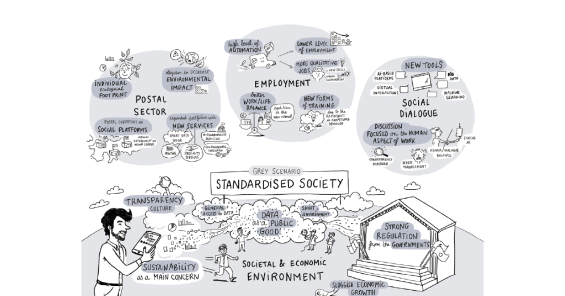The Covid-19 pandemic has brought the crucial role postal services play in our economies and societies to the fore. Since the outbreak, postal services have been guaranteed and postal workers have been delivering postal items as an essential and emergency service to all European citizens with the risks that exist. Postal services have been fulfilling their crucial public missions and serving the Universal Service Obligations.
The Postal Services Directive aims to ensure that everyone in the EU receives minimum service at a reasonable price and that postal service operators can provide their services abroad (universal service obligation). The Postal Services Directive was last revised in 2008. Since then, the postal sector has undergone major changes due to digitalisation and e-commerce. The EU Commission launched an evaluation to assess whether the Directive is still fit for purpose and achieves its original aims.
In providing its feedback, UNI Europa Post & Logistics together with its affiliated postal trade unions submitted the following text which highlights some of the crucial demands we have devised as part of our campaign ‘Save Our Post’ in view of the Postal Services Directive revision:
We reaffirm the crucial role postal services play as services of general economic interest. They are a vector of democracy and guarantee the fundamental right to communication as a basic need of EU citizens. The Postal Services Directive (PSD) promised increased quality; greater efficiency and better customer-orientation; lower prices; stronger growth to create more and better jobs. These have not come to pass.
Competition in the letters markets is limited to profitable areas only. Liberalisation exacerbated the capacity to sustainably finance the Universal Service (US). Faced with letter volume decline, posts diversified. These generated different financial realities with different market shares in the e-Commerce parcels markets. Competition in parcels is based on price and not quality. Competition is almost exclusively based on wages. Market failures are observed in last-mile parcels delivery, as postal operators and parcel providers do not abide by similar labour regulations.
Postal markets were disrupted by eCommerce growth. Postal companies prepared for competition through restructuring; outsourcing, franchising and new subsidiaries; new technologies; downsizing the network; new forms of employment. Cost-saving measures had negative implications for service quality. Citizens spend more time and travel farther to access postal services. Social and territorial cohesion is losing importance and affordability comes at the cost of lower quality. Postal liberalisation resulted in significant job losses. Part-time work is the norm and the use of subcontractors and self-employed workers increased. To be competitive in the growing parcels sector, postal companies use low labour-cost models, employment cuts, freeze wages, reduced pay and create new job categories.
Any revision should enact a fully-fledged citizen right to consume postal products (letters and parcels) based on an informed choice. This choice is informed when all market players abide by similar rules, which is currently not the case. In assessing the relevance and EU added value of the PSD, it is of utmost importance to consider how far the US mission to benefit the citizens and the consumers is met. Particular attention should be placed on vulnerable users. Market operators ought to compete within a regulatory level-playing field that abides by social and environmental standards and does not engage in a race-to-the-bottom.
The scope and quality of universal postal networks must be maintained and enhanced. In many parts of Europe, notably rural areas, postal services are the only means of communication and social inclusion. The crucial role of posts in promoting social and territorial cohesion must be upheld. The PSD revision must ensure a full citizen right to regular and affordable parcel delivery at uniform prices in a national territory.
This requires strong market regulation that guarantees good working conditions, decent wages, and high quality of service. National regulators could be made responsible to ensure that all market operators comply with minimum social and environmental standards. The recent Regulation does not address the instances of unfair competition. We call for quality of service indicators to reflect an expansive definition of the US. The definition of the US at minimum must be maintained at EU level to ensure the relevance of the PSD in the internal market for postal services and allow an EU added value.
Instances of unfair competition must be impeded by upholding fair practices in terms of labour conditions, environmental performance and quality of service. All market players involved in US provision must contribute to its financing. Companies must not be able to cherry-pick only profitable areas. Delivery has a price. Free delivery advertisements create market distortions. Liberalisation must include social cohesion measures to ensure decent wages and good working conditions for all market players involved in the postal supply chain.
Additionally, UNI Europa submitted this campaign material which sets out our key demands in terms of the Postal Services Directive revision.
The EU Commission is reviewing the Postal Services Directive, which liberalised the postal market in Europe. Liberalisation was supposed to bring about higher quality, greater efficiency, lower prices, and more and better jobs.
But these benefits never materialized. In reality, most companies have cut costs by downsizing or outsourcing the postal network leading to hundreds of thousands of job losses and poorer working conditions.
Post offices have been closed and transferred into access points at petrol stations or supermarkets with limited services.
The public spends more time and travels farther to access postal services because there are fewer post offices and fewer letter boxes.
Multiple parcel service providers deliver to the same streets on the same day, clogging up roads and polluting the environment.
Liberalisation has jeopardized the sustainable financing of the universal service obligation, and hence the very mission of postal services.
Postal liberalisation has failed postal workers, their trade unions, and ultimately European citizens.
Sign the petition to support the Save Our Post campaign to protect postal services in Europe here.



